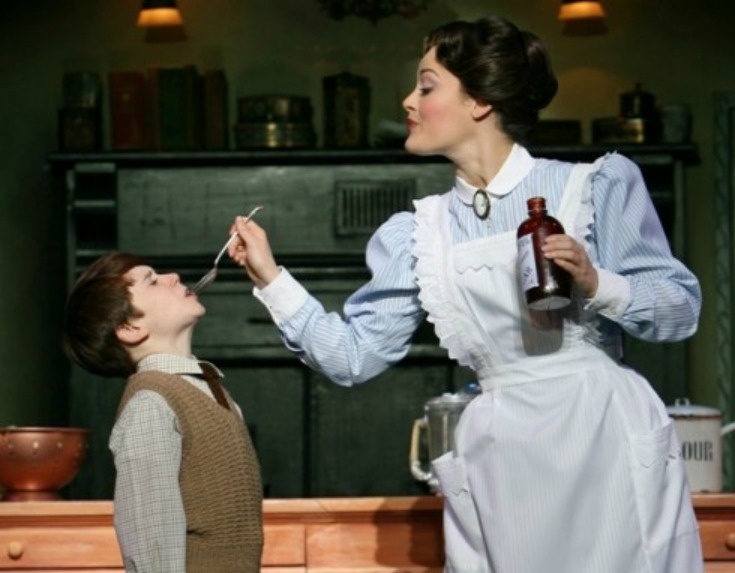|
Meaning- when you’re doing something unpleasant, find a way to sweeten it- to change its context so that it becomes a vehicle for delight rather than torturous boredom.
But how do you do that? In the movie, the children don’t want to clean up the nursery, until Mary Poppins adds some magic and singing animatronic birds to spice things up. When they finish and Poppins tells the children it’s time for their outing, Michael Banks cries, “But I want to clean the nursery again!” What she added was the miraculous. Something the children expected to be dull and routine became brilliant and delightful. But what is it that makes things dull and routine in the first place? Nowadays, I see people walking around with water bottles everywhere. At some point, the importance of drinking a lot of water spread throughout our culture, and now hardly anyone is caught without their water bottles. For many, drinking water has become a routine habit, like checking your phone. But have you ever taken a sip of water after going thirsty for hours, like after Yom Kippur perhaps? The glass of water might as well be the splitting of the sea. But the Tanya points out that the splitting of the sea miracle is nothing compared to the miracle of Existence Itself. After all, splitting the sea only involved taking something that existed already- water- and making it behave in an unusual manner. But the real miracle is that water exists in the first place. How is it that there is anything at all? And yet, this greatest of all miracles seems completely ordinary, even tedious and boring, because we are used to it. Being “used to it” means that we approach this moment through the lens of what has come before- through the monotony of conditioned memory. But step fully into the present, and the miracle reveals itself: there is nothing ordinary at all about this moment. Step out of your conditioned mind, and it’s as if you step into a different universe. In fact, you do- you step out of the universe of your head, into the universe of the Real. This week’s parsha opens with a promise: “Im bekhukotai telekhu v’et mitzvotai tishmeru va’asitem otam… “If you walk with My decrees and guard My commandments and do them, I will provide your rains in their time… your vintage will last until the end of the sowing…” The word that’s translated “with my decrees” is the name of this reading- Bekhukotai. A khok is a type of commandment that doesn’t necessarily have an obvious rationale. For example, it’s easy to understand laws like “Don’t murder” and “Don’t steal.” Those laws that “make sense” are called mishpatim. But “Don’t eat shrimp” is not so clear. That’s a khok. And yet, the truth is that everything is a khok. Does it “make sense” that anything exists at all? Existence is a mystery, a miracle, an enigma! The next few words say “guard my commandments…” The word for “commandment” is mitzvah, which in its Aramaic root actually means “to connect.” So if we retranslate the sentence with these underlying meanings, we get: “If you walk with My Mysteries and guard My Connection…” In other words, step into the mystery of the present, where Existence is no longer routine, no longer ordinary. Guard your connection with this Mystery, and then- “Your vintage will last until the end of the sowing…” Meaning, your drunkenness on the wine of this moment will sweeten all your labors- a spoon full of sugar! In the late 19th century, there was a hassid by the name of Reb Aharon who lived in the town of Dokshetz. Every Saturday night in the House of Study, Reb Aharon would make a batch of panes- a hot drink made from boiling water, vodka and sugar. There he would serve the drink to crowds of spiritually thirsty folks before teaching hassidus- spiritual philosophy. People would come from all over to warm their bones and make merry with the panes while they also drank in his holy teachings. Once a year, Reb Aharon would travel to see his rebbe in Lubavitch- Reb Shmuel. On the Saturday night following his return from Lubavitch, he would concoct an extra large batch of panes for the crowd and then share the luminescent teachings he had heard from the mouth of his master. Those nights were on fire! Once, when Reb Aharon was in Lubavitch, his rebbe said to him: “I hear that in Dokshetz, they learn hassidus with panes. Tell me, what connection is there between Torah and getting drunk?” Embarrassed, Reb Aharon returned home and put an end to his ritual. From then on, he continued his teaching on Saturday nights, but without the panes. People still came to learn, but each week there were fewer and fewer than the last week. Before long, the vibrant crowd was reduced to a few devoted die-hards. The next time Reb Aharon was in Lubavitch, his rebbe asked him- “What’s doing in Dokshetz?” Reb Aharon reluctantly reported that his class now attracted only a fraction of the folks that used to come for the “drink-and-learn” format. “Nu,” said the rebbe, “So bring back the drink- Abi men zol lernen hassidus- so long as they learn hassidus!” On this Shabbat Bekhukotai, the Sabbath with the Mystery, may we too become drunk on the words of the teaching, and may the teaching lead us into the depths of Mystery that is Nothing but This. Good Shabbos! Good Shabbos!
0 Comments
Leave a Reply. |
Archives
July 2024
|

 RSS Feed
RSS Feed